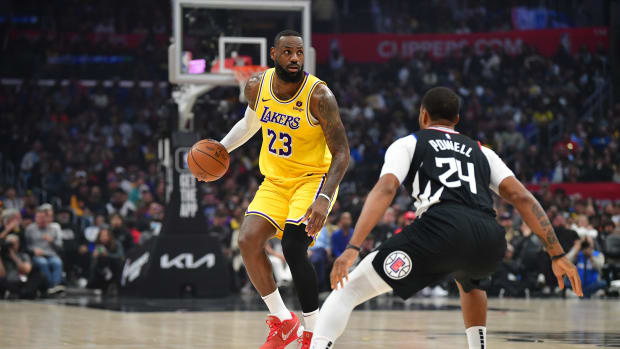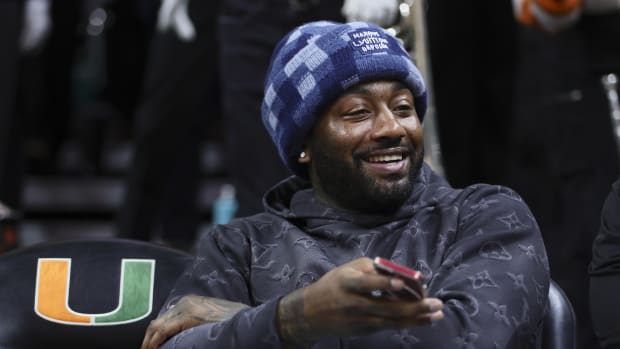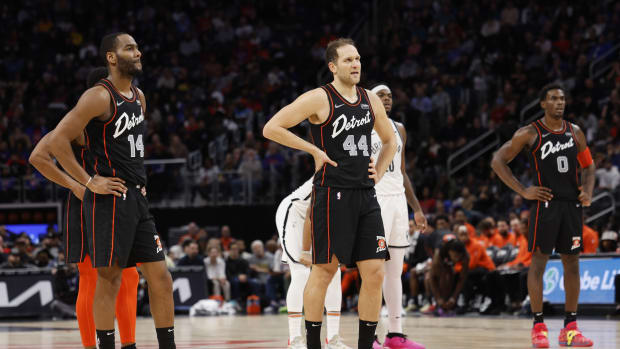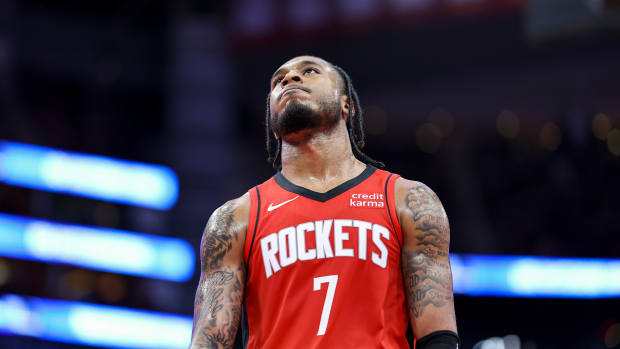What's Next in Zion Williamson's Extended Federal Lawsuit?
Very few NBA rookies are plaintiffs in federal lawsuits. Even fewer are sued in state court right after they sue in federal court. In fact, there might be only one rookie in the league’s 73-year history who fits this description.
Zion Williamson has become a seasoned litigant months before he plays in his first NBA regular season game.
On Wednesday, attorneys for the New Orleans Pelicans forward filed a motion in the U.S. District Court for the Middle District of North Carolina. They hope to expand Williamson’s lawsuit against Prime Sports Marketing, a Florida based company, and its president, Gina Ford. Wednesday’s filing was first reported by ESPN’s Adrian Wojnarowski.
The core facts that led to the dispute
As Williamson retells history, he signed an unenforceable “Consulting and Joint Marketing and Branding Agreement” contract with Ford on April 20. The contract specified that Ford would represent Williamson in marketing and endorsement matters. Ford has substantial experience in the sports and entertainment industries. She has represented 11-time world champion sprinter Usain Bolt, Wanda Durant (the mother of Brooklyn Nets star Kevin Durant) and other prominent persons in deals related to their brand value.
Williamson, a Duke freshman at the time, unknowingly forfeited his remaining eligibility on April 20. Although a new NCAA rule allows underclassmen basketball players to sign with an NCAA-certified agent and remain able to withdraw from the NBA draft by late May, Ford was not an NCAA-certified agent. Ford, in fact, does not hold herself out as a “player agent”, at least as that term is understood to mean an agent who represents athletes in negotiating employment contracts. Ford represents athletes in maximizing the value of their names, images and likenesses through contracts outside of their employment.
As a practical matter, Ford’s lack of NCAA certification was immaterial. There was virtually no chance that Williamson would return to Duke for his sophomore season. On the day he signed with Prime Sports, Williamson had already declared for the 2019 NBA Draft and was the presumptive No.1 pick. Since early 2019, Williamson has been projected as the most marketable new player to enter the NBA since LeBron James in 2003. While Williamson might have been ambivalent about the Pelicans winning the lottery, there was never a credible belief that Williamson would forgo entering the NBA in 2019.
In late May, Williamson effectively severed ties with Ford. He retained CAA to represent him in both employment agreements and endorsement deals. Williamson’s agreement with CAA was thus in direct conflict with the contract Williamson had already signed with Ford.
Ford, the “for cause” clause and Williamson’s justification
Ford is on the defense in federal court but she’s on offense in state court.
In a separate lawsuit filed in Miami-Dade County Circuit Court, Ford has sued Williamson and CAA for $100 million. Ford insists that Williamson breached his contract with her and acted in bad faith. Per its own wording, the contract could only be terminated “for cause.” Although “for cause” is not defined in the contract, such a phrase normally refers to one party breaking the law or deliberately violating a contractual duty. In the absence of cause, Williamson or Ford could credibly demand damages for the other’s breach.
Judge Loretta Copeland Biggs, whom President Barack Obama nominated to serve as a federal judge in 2014, is presiding over Williamson’s lawsuit. The lawsuit was originally filed on June 13, a week before Williamson would be selected first overall by the Pelicans.
Williamson’s attorneys include North Carolina attorney John Wester of Robinson, Bradshaw & Hinson and New York attorney Jeffrey Klein of Weil, Gotshal & Manges. In Wednesday’s pleading, they seek to persuade Judge Biggs to accept an amended complaint. They stress that both parties agreed to allow Ford until September 16 to file an answer and that Ford has not yet. Williamson’s attorneys contend that since Ford’s attorneys still have more than three weeks to answer, it would not prejudice Ford’s position if Judge Biggs permitted the amended complaint.
Zion’s key legal claims and attempt to strengthen them
The original complaint contained only one count. Williamson petitioned the court to declare his contract null and void on account of Ford failing to do two things: register as an agent in North Carolina and include a mandatory notice provision in the contract she presented to Williamson.
North Carolina’s Uniform Athlete Agent Act (UAAA) prohibits a person from acting as an agent unless he or she first obtains registration from the North Carolina’s Secretary of State’s office. To deter agents from duping college underclassmen into turning pro and thus forfeiting NCAA eligibility, the UAAA also requires that representation contracts include, in boldface type and in capital letters, several warnings. One warning is that the athlete will lose his or her NCAA eligibility by signing the contract. Another mandatory warning is that both the athlete and agent must notify the athletic director for the athlete’s college. Williamson’s contract with Ford does not contain those warnings.
Approximately 40 states have adopted a version of the UAAA. Of potential advantage to Williamson, North Carolina’s UAAA applies not only to employment contracts but also to endorsement deals.
Williamson’s attorneys now seek to add two additional claims. One is their contention that Ford violated North Carolina’s Unfair and Deceptive Trade Practices Act (UDTPA). The UDTPA prohibits businesspersons from engaging in conduct that reflects bad faith and is grossly manipulative, oppressive and unscrupulous. The UDTPA is particularly threatening since it authorizes the court to impose treble damages—meaning actual damages multiplied by three—and to compel the defendant to pay for the plaintiff’s attorneys fees. In other words, if Williamson proves that Ford violated the UDTPA she could be required to pay him a considerable amount of money (three times the damages) plus his likely expensive attorneys’ fees.
Williamson’s attorneys would also like to add a claim for fraudulent inducement and rescission. Fraudulent inducement refers to the defendant deceitfully using lies to trick the plaintiff into signing a contract. The lies must be substantial and relied upon by the plaintiff to his or her harm. If these elements are proved, the contract can be revoked or cancelled.
Further, the amended complaint contains additional assertions of fact. These alleged facts have not been proven in court. Ford will likely deny them. Still, Williamson’s attorneys incorporate them as a means of justifying the addition of the two new claims.
To that end, Williamson’s attorneys describe Ford as “immoral, unethical, and unscrupulous” in her interactions with Williamson and his family. The complaint portrays Ford as manipulating Williamson to such a degree that he would hastily and regrettably sign a contract that unethically benefited Ford far more than Williamson. Indeed, Ford is described as “initiating a multitude of contacts with Mr. Williamson and his family” with the sole goal of signing Williamson to a contract with “draconian terms.” One such term is, as explained above, the inability of either party to terminate the contract in the absence of cause. Ford is further described as engaging in “flagrant disregard” of North Carolina law and as grossly exaggerating her professional achievements and skills. The amended complaint bluntly refutes that Ford had the capacity to maximize Williamson’s brand. Basically, Williamson’s attorneys try to dismiss Ford as an imposter who told tall tales about her past.
Williamson’s litigation could include Jordan Brand
This is a complicated, multi-lawsuit litigation. Ford, as referenced above, has filed her own lawsuit against Williamson and CAA in a Miami court. Her case is detailed in a previous The Crossover legal story. Needless to say, Ford depicts Williamson as anything but a victim. Williamson was 18 years old in April and therefore an adult—and thus of requisite age to contract—when he signed with Ford. Williamson clearly regretted signing with Ford. However, regret is not a legal justification to breach a contract where one has no right to do so.
It would not be surprising if the litigation expands to include Nike. As I detail in a recent The Crossover legal story on Williamson and Michael Jordan, Williamson signing a five-year, $75 million deal with Jordan Brand could motivate Ford’s attorneys—Stephen Drummond and Joann Squillace of the New York-based law firm Drummond & Squillace—to attempt to add Nike to the litigation.
Ford might assert that she is owed the commission, or at least part of the commission, on the deal Williamson signed with Jordan Brand. This argument would be bolstered if Ford possesses evidence showing that she negotiated with Jordan Brand on Williamson’s behalf. Ford’s Miami complaint contends that she engaged in negotiations with a long list of companies. They include Puma, Activision Publishing (Call of Duty video game), EA Sports (NBA Live), 2K Sports (NBA 2K), General Mills (Wheaties), Beats by Dre, Chase Bank, Harper Collins, Monster Hydro, Burger King, Mercedes Benz, T-Mobile, Kraft Heinz, Powerade (Coca-Cola) and Biosteel.
Pretrial discovery threat should lead to a settlement
It’s theoretically possible that the two lawsuits could advance to trials, but don’t bank on it.
If the litigation remains on the docket, all of the parties involved would be subject to pretrial discovery. They would thus need to share emails, texts, bank statements, receipts and related documents with attorneys for the other side. Such materials could contain sensitive information that risks reputational harm.
Williamson, for example, would be required to share documents that explain how and why he dropped Ford for CAA. Also, even if Nike isn’t brought into the litigation as a party, it could be required to share information on its dealings with Williamson—including when such dealings began. Given that Michael Avenatti has told a federal judge that he is in possession of documents which unambiguously show that Nike officials attempted to pay Williamson while he was in high school, Nike may have concerns about how Williamson’s litigation could impact the publicly traded company.
Along those lines, various persons in Williamson’s orbit could be forced to answer questions in depositions and through interrogatories. They would do so while under oath and under penalty of perjury. Duke head coach Mike Krzyzewski, for example, might be asked to detail the Blue Devils’ recruitment of Williamson. He might also be questioned on his potential involvement in Williamson’s choice of player representation. Meanwhile, Jordan could be asked to describe his role in Jordan Brand’s signing of Williamson and how such actions comported with his duties as governor of the Charlotte Hornets.
With these risks in mind, the most likely conclusion to the litigation is Williamson and/or CAA paying Ford. In exchange, Ford would agree to drop her lawsuit and relinquish any claims she may have against Williamson, CAA and any related parties. The parties would also most likely agreement to non-disclosure/non-disparagement clauses.
Michael McCann is SI’s Legal Analyst. He is also an attorney and Director of the Sports and Entertainment Law Institute at the University of New Hampshire Franklin Pierce School of Law.




































